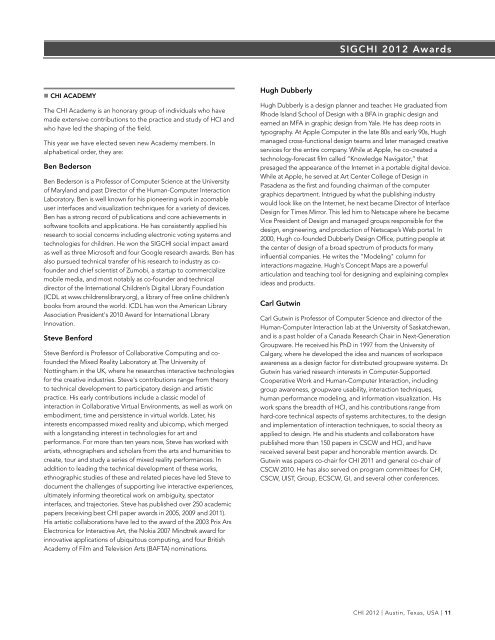Printed Program (pdf) - CHI 2012 - Association for Computing ...
Printed Program (pdf) - CHI 2012 - Association for Computing ...
Printed Program (pdf) - CHI 2012 - Association for Computing ...
Create successful ePaper yourself
Turn your PDF publications into a flip-book with our unique Google optimized e-Paper software.
n <strong>CHI</strong> ACADEMY<br />
The <strong>CHI</strong> Academy is an honorary group of individuals who have<br />
made extensive contributions to the practice and study of HCI and<br />
who have led the shaping of the field.<br />
This year we have elected seven new Academy members. In<br />
alphabetical order, they are:<br />
Ben Bederson<br />
Ben Bederson is a Professor of Computer Science at the University<br />
of Maryland and past Director of the Human-Computer Interaction<br />
Laboratory. Ben is well known <strong>for</strong> his pioneering work in zoomable<br />
user interfaces and visualization techniques <strong>for</strong> a variety of devices.<br />
Ben has a strong record of publications and core achievements in<br />
software toolkits and applications. He has consistently applied his<br />
research to social concerns including electronic voting systems and<br />
technologies <strong>for</strong> children. He won the SIG<strong>CHI</strong> social impact award<br />
as well as three Microsoft and four Google research awards. Ben has<br />
also pursued technical transfer of his research to industry as cofounder<br />
and chief scientist of Zumobi, a startup to commercialize<br />
mobile media, and most notably as co-founder and technical<br />
director of the International Children’s Digital Library Foundation<br />
(ICDL at www.childrenslibrary.org), a library of free online children’s<br />
books from around the world. ICDL has won the American Library<br />
<strong>Association</strong> President's 2010 Award <strong>for</strong> International Library<br />
Innovation.<br />
Steve Ben<strong>for</strong>d<br />
Steve Ben<strong>for</strong>d is Professor of Collaborative <strong>Computing</strong> and cofounded<br />
the Mixed Reality Laboratory at The University of<br />
Nottingham in the UK, where he researches interactive technologies<br />
<strong>for</strong> the creative industries. Steve's contributions range from theory<br />
to technical development to participatory design and artistic<br />
practice. His early contributions include a classic model of<br />
interaction in Collaborative Virtual Environments, as well as work on<br />
embodiment, time and persistence in virtual worlds. Later, his<br />
interests encompassed mixed reality and ubicomp, which merged<br />
with a longstanding interest in technologies <strong>for</strong> art and<br />
per<strong>for</strong>mance. For more than ten years now, Steve has worked with<br />
artists, ethnographers and scholars from the arts and humanities to<br />
create, tour and study a series of mixed reality per<strong>for</strong>mances. In<br />
addition to leading the technical development of these works,<br />
ethnographic studies of these and related pieces have led Steve to<br />
document the challenges of supporting live interactive experiences,<br />
ultimately in<strong>for</strong>ming theoretical work on ambiguity, spectator<br />
interfaces, and trajectories. Steve has published over 250 academic<br />
papers (receiving best <strong>CHI</strong> paper awards in 2005, 2009 and 2011).<br />
His artistic collaborations have led to the award of the 2003 Prix Ars<br />
Electronica <strong>for</strong> Interactive Art, the Nokia 2007 Mindtrek award <strong>for</strong><br />
innovative applications of ubiquitous computing, and four British<br />
Academy of Film and Television Arts (BAFTA) nominations.<br />
Hugh Dubberly<br />
SIG<strong>CHI</strong> <strong>2012</strong> Awards<br />
Hugh Dubberly is a design planner and teacher. He graduated from<br />
Rhode Island School of Design with a BFA in graphic design and<br />
earned an MFA in graphic design from Yale. He has deep roots in<br />
typography. At Apple Computer in the late 80s and early 90s, Hugh<br />
managed cross-functional design teams and later managed creative<br />
services <strong>for</strong> the entire company. While at Apple, he co-created a<br />
technology-<strong>for</strong>ecast film called “Knowledge Navigator,” that<br />
presaged the appearance of the Internet in a portable digital device.<br />
While at Apple, he served at Art Center College of Design in<br />
Pasadena as the first and founding chairman of the computer<br />
graphics department. Intrigued by what the publishing industry<br />
would look like on the Internet, he next became Director of Interface<br />
Design <strong>for</strong> Times Mirror. This led him to Netscape where he became<br />
Vice President of Design and managed groups responsible <strong>for</strong> the<br />
design, engineering, and production of Netscape’s Web portal. In<br />
2000, Hugh co-founded Dubberly Design Office, putting people at<br />
the center of design of a broad spectrum of products <strong>for</strong> many<br />
influential companies. He writes the "Modeling" column <strong>for</strong><br />
interactions magazine. Hugh's Concept Maps are a powerful<br />
articulation and teaching tool <strong>for</strong> designing and explaining complex<br />
ideas and products.<br />
Carl Gutwin<br />
Carl Gutwin is Professor of Computer Science and director of the<br />
Human-Computer Interaction lab at the University of Saskatchewan,<br />
and is a past holder of a Canada Research Chair in Next-Generation<br />
Groupware. He received his PhD in 1997 from the University of<br />
Calgary, where he developed the idea and nuances of workspace<br />
awareness as a design factor <strong>for</strong> distributed groupware systems. Dr.<br />
Gutwin has varied research interests in Computer-Supported<br />
Cooperative Work and Human-Computer Interaction, including<br />
group awareness, groupware usability, interaction techniques,<br />
human per<strong>for</strong>mance modeling, and in<strong>for</strong>mation visualization. His<br />
work spans the breadth of HCI, and his contributions range from<br />
hard-core technical aspects of systems architectures, to the design<br />
and implementation of interaction techniques, to social theory as<br />
applied to design. He and his students and collaborators have<br />
published more than 150 papers in CSCW and HCI, and have<br />
received several best paper and honorable mention awards. Dr.<br />
Gutwin was papers co-chair <strong>for</strong> <strong>CHI</strong> 2011 and general co-chair of<br />
CSCW 2010. He has also served on program committees <strong>for</strong> <strong>CHI</strong>,<br />
CSCW, UIST, Group, ECSCW, GI, and several other conferences.<br />
<strong>CHI</strong> <strong>2012</strong> | Austin, Texas, USA | 11


